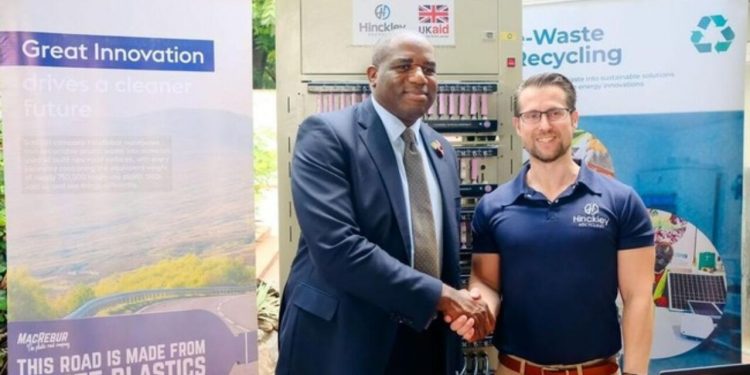UK Foreign Secretary David Lammy MP launched a landmark report in Lagos, spotlighting Africa’s pivotal role in the global battery supply chain. The report, titled “From Minerals to Manufacturing: Africa’s Competitiveness in Global Battery Supply Chains,” was developed through the UK’s Manufacturing Africa program in partnership with the Faraday Institution. It outlines promising investment opportunities within Africa’s burgeoning battery industry, emphasizing the continent’s transition from raw material extraction to battery manufacturing.
This comprehensive report highlights that with the right investments and policy frameworks, Africa can refine locally sourced minerals like lithium, nickel, manganese, and copper at costs up to 40% lower than global competitors by 2030. Establishing just one high-quality refinery for each of these minerals could generate an estimated USD 6.8 billion in annual revenues while creating approximately 3,500 high-quality jobs in the battery supply chain.
Moreover, the report indicates that countries such as Tanzania and Morocco could produce competitively-priced batteries. Under favorable conditions, Morocco could achieve production costs of $72/kWh, while Tanzania could reach $68/kWh. These costs align closely with those in Europe, where production benefits from substantial subsidies.
The report also delves into the growing demand for batteries and identifies additional opportunities in battery assembly, packs, and recycling. It maps the existing companies involved in Africa’s battery value chains and offers actionable recommendations for policymakers and investors to harness these opportunities effectively.
This launch follows Lammy’s earlier speech at Kew Gardens on September 17, 2024, where he announced plans to establish a Global Clean Power Alliance. During his visit to Lagos, he engaged with key stakeholders, including investors and companies in the clean energy sector, such as UK firms SteamaCo and Hinckley Recycling, both of which are actively investing in Nigeria.
Helen King, Director for Economic Development and Partnerships at the UK Foreign Commonwealth and Development Office, remarked, “This report encourages investors to consider Africa not just as a buyer but as a potential manufacturer of batteries. The UK Government’s mission is to support inclusive global growth, and this sector presents significant opportunities for job creation and economic development in Africa.”
Aminu Umar-Saqid, Managing Director of Nigeria’s Sovereign Investment Authority, underscored the importance of bridging traditional energy infrastructure with renewable energy solutions, facilitated by enhanced energy storage. He revealed that the NSIA is piloting the development of an integrated battery manufacturing facility to strengthen Nigeria’s industrial base and support its Energy Transition Plan. Umar-Saqid noted that the insights from this report have been instrumental in shaping their strategy.
Professor Martin Freer, CEO of the Faraday Institution, highlighted Africa’s abundant critical minerals and the potential for the continent to play a significant role in the global battery supply chain. He stated that overcoming challenges related to investment, infrastructure, and workforce capacity is crucial for this potential to be realized. The report serves as a valuable resource for stakeholders and investors looking to explore opportunities beyond mining.
Kemi Onabanjo, Nigeria’s Country Lead for the Manufacturing Africa program, emphasized the dual benefits of investing in battery manufacturing: job creation and reduced production costs, all while contributing to global climate objectives. She pointed out that the UK-Aid-funded Manufacturing Africa project has already mobilized £1.2 billion in foreign direct investment (FDI) for local manufacturing and generated 95,000 jobs across the continent through similar support initiatives.
As Africa stands on the brink of a battery manufacturing revolution, this report is a clarion call for investors, policymakers, and industry leaders to capitalize on the continent’s rich mineral resources and innovative potential, ultimately transforming Africa into a key player in the global battery market.










